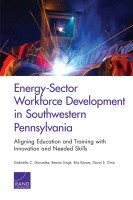| 来源类型 | Research Reports
|
| 规范类型 | 报告
|
| ISBN | 9780833088109
|
| 来源ID | RR-807-NETL
|
| Energy-Sector Workforce Development in Southwestern Pennsylvania: Aligning Education and Training with Innovation and Needed Skills |
| Gabriella C. Gonzalez; Reema Singh; Rita Karam; David S. Ortiz
|
| 发表日期 | 2014
|
| 出版年 | 2014
|
| 页码 | 78
|
| 语种 | 英语
|
| 结论 |
Four Drivers Motivate Innovation in the Energy Sector- Innovation in the energy sector that affects necessary workforce skills can be organized into the following motivators: increasing productivity in energy extraction, minimizing risk of environmental damage and reducing emissions of carbon dioxide, integrating renewable energy into the grid, and improving energy end-use efficiency.
The Energy Sector Needs an Agile, Skilled Workforce to Adapt to Changes in Technology and Innovation- Core competencies needed for the energy workforce to respond to technological innovations include content knowledge of the industry in question, transferable, hands-on skills, and soft skills or workplace competencies.
Five Practices Characterize Postsecondary Training and Education Programs That Best Meet the Needs of an Evolving Labor Market- Postsecondary education and training programs that tend to be the most successful in adapting to evolving labor-market needs have well-developed mechanisms to anticipate demand for specific occupations by developing consistent, ongoing relationships with industry leaders; curricula that include occupation-specific and generic skills; complementary in-class and workplace learning opportunities; quality instructors with workplace and teaching experience; and ongoing quality-assurance processes.
Case-Study Analysis of Southwestern Pennsylvania's Regional Education and Training Providers Reveal That They Display Some Aspects of the Five Promising Practices- Mechanisms for anticipating occupation demands through relationships with industry leaders were not typically ongoing.
- Curricula across the institutions included occupation-specific and generic skills, but delivery varied.
- Workplace learning opportunities to complement in-class opportunities were not evident.
- Hiring quality instructors with workplace and teaching experience has proven difficult.
- Programs need to undertake ongoing quality-assurance practices.
|
| 摘要 |
- Develop sustained and continuous partnerships between industry leaders and education and training providers.
- Develop education and training programs that integrate technical, occupation-specific training along with workplace readiness and other soft skills.
- Encourage recruitment and retention of quality instructors.
- Incorporate mechanisms to continuously ensure quality of education and training programs.
- Document progress on whether regional energy-sector training and employment goals are being met.
|
| 主题 | Education Curriculum
; Educational Institutions
; Employment and Unemployment
; Natural Gas
; Occupational Training
; Pennsylvania
; Postsecondary Education
; Workforce Management
|
| URL | https://www.rand.org/pubs/research_reports/RR807.html
|
| 来源智库 | RAND Corporation (United States)
|
| 资源类型 | 智库出版物
|
| 条目标识符 | http://119.78.100.153/handle/2XGU8XDN/107774
|
推荐引用方式
GB/T 7714 |
Gabriella C. Gonzalez,Reema Singh,Rita Karam,et al. Energy-Sector Workforce Development in Southwestern Pennsylvania: Aligning Education and Training with Innovation and Needed Skills. 2014.
|
|
文件名:
|
x1495316333239.jpg
|
|
格式:
|
JPEG
|

|
文件名:
|
RAND_RR807.pdf
|
|
格式:
|
Adobe PDF
|
除非特别说明,本系统中所有内容都受版权保护,并保留所有权利。